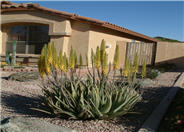
Common name:Aloe Vera or Medicinal Aloe
Botanical name:Aloe vera
The rosette of this plant consists of fleshy gray green leaves, which are narrow, succulent and erect with soft spines on margins. This Aloe is a slow to moderate grower. Flowers are spikes of yellow, 2'-3' tall and bloom late winter to summer. This aloe can form large clumps. It will tolerate full to partial sun, needs some supplemental water in heat and good drainage. It attracts hummingbirds. This aloe is a Mediterranean native. The sap is used for burns and abrasions.
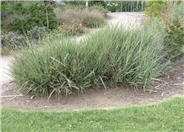
Common name:Canyon Prince Wild Rye
Botanical name:Leymus condensatus 'Canyon Prince'
One of the best known and utilized native grass selections in Southern California, this beautiful, blue gray foliage spreads out 3'-4' or more. It will reach a height of 2'-3'. It rarely flowers. It does spread by rhizomes although not as vigorously as some closely related species. It can be extremely drought tolerant and care must be taken not to over water this species as it can rot from the center. Otherwise, it is carefree and requires virtually no maintenance.
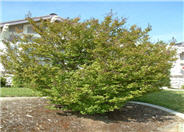
Common name:Crape Myrtle
Botanical name:Lagerstroemia indica
The new leaves of this species are 2" long, bright green, and tinged with bronze. Its fall color is affected by the weather. While it has a bare outline, its rounded seed capsules add interest. Its delicate flowers bloom in 6"-12" long clusters. The colors of its flowers are shades of red, rose, pink, purple, and white. It thrives on heat and new cultivars have been created that resist mildew.
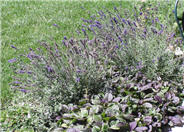
Common name:Hidcote English Lavender
Botanical name:Lavandula angustifolia 'Hidcote'
This is a slow growing lavender that grows to 1' tall with deep purple flowers. It is drought tolerant and attracts hummingbirds and butterflies. -Cornflower Farms
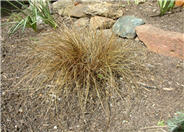
Common name:Curly Top Sedge
Botanical name:Carex buchananii
This orange bronze ornamental grass is 2'-3' tall and 1'-2' wide and does best in full sun to part shade. It needs moderate amount of water. Blades have gentle curls. This grass looks great when planted with green or gray colored foliage plants.
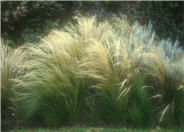
Common name:Mexican Feather Grass
Botanical name:Nassella tenuissima
This ornamental grass grows to 2' tall. It goes partially dormant during the summer but green in spring and fall. It prefers a sunny, well drained site. This plant can be invasive in some areas, so use caution. To keep reseeding to a minimum, drip irrigation will be best. Cut back in early spring to remove dormant foliage and dried seed heads. It can also tolerate dry shade. It grows to 10" wide and is the finest textured of the ornamental grasses.
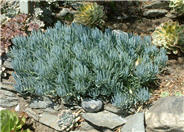
Common name:Kleinia
Botanical name:Senecio mandraliscae
This succulent perennial will grow to about 1.5' tall and 2' wide. It has curved, bluish gray leaves that are about 3.5" long and very slender.
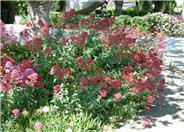
Common name:Jupiter's Beard, Red Valerian
Botanical name:Centranthus ruber
This perennial groundcover will grow 1'-3' high and has medium-size blue/green leaves with red, pink, or white flowers that bloom in the summer.

Common name:Aloe Vera or Medicinal Aloe
Botanical name:Aloe vera
The rosette of this plant consists of fleshy gray green leaves, which are narrow, succulent and erect with soft spines on margins. This Aloe is a slow to moderate grower. Flowers are spikes of yellow, 2'-3' tall and bloom late winter to summer. This aloe can form large clumps. It will tolerate full to partial sun, needs some supplemental water in heat and good drainage. It attracts hummingbirds. This aloe is a Mediterranean native. The sap is used for burns and abrasions.
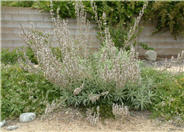
Common name:White Sage, Sacred White Sage
Botanical name:Salvia apiana
This woody shrub has long stems with silvery white leaves and fragrant white flowers that bloom in the spring. It provides a strong structural form as a garden focal point. It can reach 6' tall and 6' wide.
| Designer: | Southwest Home and Garden |
Photographer: GardenSoft |
Soils and Compost:
Maintain a two to four inch layer of mulch on the soil surface to reduce weeds, infiltrate rain water, and reduce compaction.
Water Saving Tip:
Apply as little fertilizer as possible.
If you use fertilizer make sure it stays on the landscape, and carefully water it in so there is NO runoff.
Integrated Pest Management:
Attract, or buy beneficial insects such as ladybugs and lacewings to control pest outbreaks in your garden.
